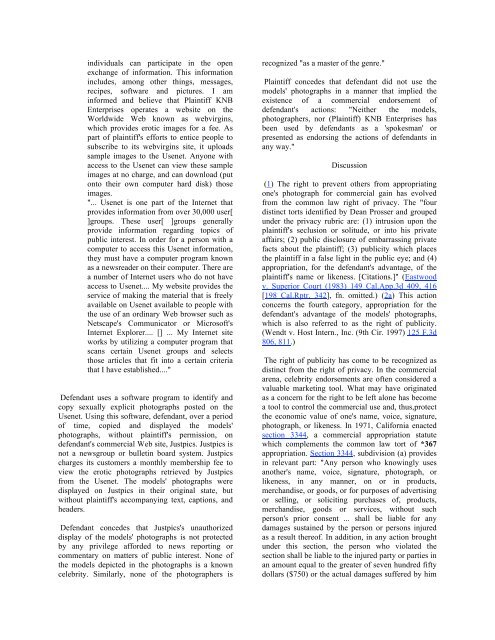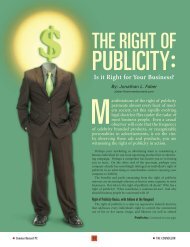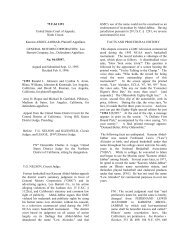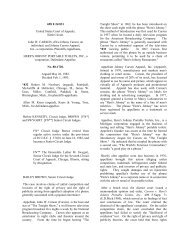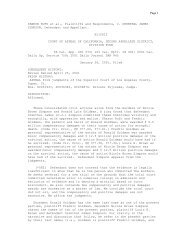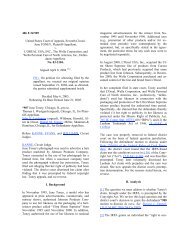KNB ENTERPRISES, Plaintiff and Appellant, v ... - Right Of Publicity
KNB ENTERPRISES, Plaintiff and Appellant, v ... - Right Of Publicity
KNB ENTERPRISES, Plaintiff and Appellant, v ... - Right Of Publicity
You also want an ePaper? Increase the reach of your titles
YUMPU automatically turns print PDFs into web optimized ePapers that Google loves.
individuals can participate in the open<br />
exchange of information. This information<br />
includes, among other things, messages,<br />
recipes, software <strong>and</strong> pictures. I am<br />
informed <strong>and</strong> believe that <strong>Plaintiff</strong> <strong>KNB</strong><br />
Enterprises operates a website on the<br />
Worldwide Web known as webvirgins,<br />
which provides erotic images for a fee. As<br />
part of plaintiff's efforts to entice people to<br />
subscribe to its webvirgins site, it uploads<br />
sample images to the Usenet. Anyone with<br />
access to the Usenet can view these sample<br />
images at no charge, <strong>and</strong> can download (put<br />
onto their own computer hard disk) those<br />
images.<br />
"... Usenet is one part of the Internet that<br />
provides information from over 30,000 user[<br />
]groups. These user[ ]groups generally<br />
provide information regarding topics of<br />
public interest. In order for a person with a<br />
computer to access this Usenet information,<br />
they must have a computer program known<br />
as a newsreader on their computer. There are<br />
a number of Internet users who do not have<br />
access to Usenet.... My website provides the<br />
service of making the material that is freely<br />
available on Usenet available to people with<br />
the use of an ordinary Web browser such as<br />
Netscape's Communicator or Microsoft's<br />
Internet Explorer.... [] ... My Internet site<br />
works by utilizing a computer program that<br />
scans certain Usenet groups <strong>and</strong> selects<br />
those articles that fit into a certain criteria<br />
that I have established...."<br />
Defendant uses a software program to identify <strong>and</strong><br />
copy sexually explicit photographs posted on the<br />
Usenet. Using this software, defendant, over a period<br />
of time, copied <strong>and</strong> displayed the models'<br />
photographs, without plaintiff's permission, on<br />
defendant's commercial Web site, Justpics. Justpics is<br />
not a newsgroup or bulletin board system. Justpics<br />
charges its customers a monthly membership fee to<br />
view the erotic photographs retrieved by Justpics<br />
from the Usenet. The models' photographs were<br />
displayed on Justpics in their original state, but<br />
without plaintiff's accompanying text, captions, <strong>and</strong><br />
headers.<br />
Defendant concedes that Justpics's unauthorized<br />
display of the models' photographs is not protected<br />
by any privilege afforded to news reporting or<br />
commentary on matters of public interest. None of<br />
the models depicted in the photographs is a known<br />
celebrity. Similarly, none of the photographers is<br />
recognized "as a master of the genre."<br />
<strong>Plaintiff</strong> concedes that defendant did not use the<br />
models' photographs in a manner that implied the<br />
existence of a commercial endorsement of<br />
defendant's actions: "Neither the models,<br />
photographers, nor (<strong>Plaintiff</strong>) <strong>KNB</strong> Enterprises has<br />
been used by defendants as a 'spokesman' or<br />
presented as endorsing the actions of defendants in<br />
any way."<br />
Discussion<br />
(1) The right to prevent others from appropriating<br />
one's photograph for commercial gain has evolved<br />
from the common law right of privacy. The "four<br />
distinct torts identified by Dean Prosser <strong>and</strong> grouped<br />
under the privacy rubric are: (1) intrusion upon the<br />
plaintiff's seclusion or solitude, or into his private<br />
affairs; (2) public disclosure of embarrassing private<br />
facts about the plaintiff; (3) publicity which places<br />
the plaintiff in a false light in the public eye; <strong>and</strong> (4)<br />
appropriation, for the defendant's advantage, of the<br />
plaintiff's name or likeness. [Citations.]" (Eastwood<br />
v. Superior Court (1983) 149 Cal.App.3d 409, 416<br />
[198 Cal.Rptr. 342], fn. omitted.) (2a) This action<br />
concerns the fourth category, appropriation for the<br />
defendant's advantage of the models' photographs,<br />
which is also referred to as the right of publicity.<br />
(Wendt v. Host Intern., Inc. (9th Cir. 1997) 125 F.3d<br />
806, 811.)<br />
The right of publicity has come to be recognized as<br />
distinct from the right of privacy. In the commercial<br />
arena, celebrity endorsements are often considered a<br />
valuable marketing tool. What may have originated<br />
as a concern for the right to be left alone has become<br />
a tool to control the commercial use <strong>and</strong>, thus,protect<br />
the economic value of one's name, voice, signature,<br />
photograph, or likeness. In 1971, California enacted<br />
section 3344, a commercial appropriation statute<br />
which complements the common law tort of *367<br />
appropriation. Section 3344, subdivision (a) provides<br />
in relevant part: "Any person who knowingly uses<br />
another's name, voice, signature, photograph, or<br />
likeness, in any manner, on or in products,<br />
merch<strong>and</strong>ise, or goods, or for purposes of advertising<br />
or selling, or soliciting purchases of, products,<br />
merch<strong>and</strong>ise, goods or services, without such<br />
person's prior consent ... shall be liable for any<br />
damages sustained by the person or persons injured<br />
as a result thereof. In addition, in any action brought<br />
under this section, the person who violated the<br />
section shall be liable to the injured party or parties in<br />
an amount equal to the greater of seven hundred fifty<br />
dollars ($750) or the actual damages suffered by him


